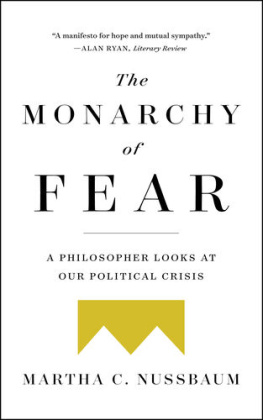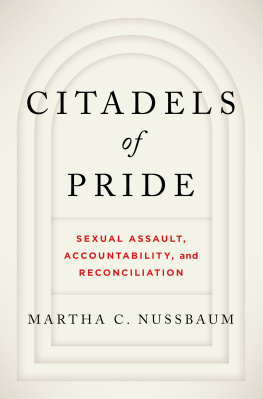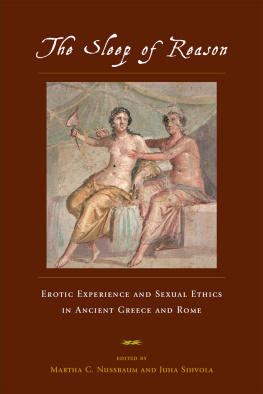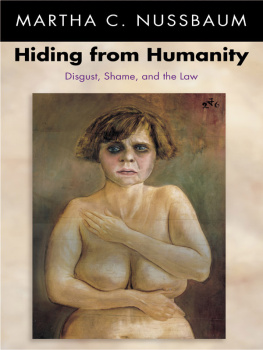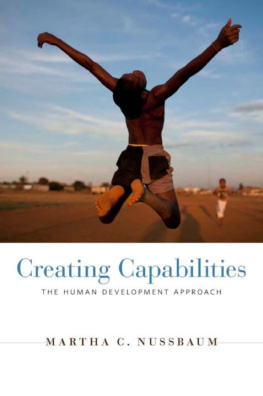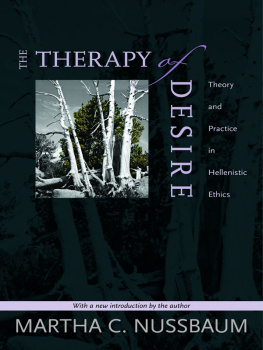Thank you for downloading this Simon & Schuster ebook.
Get a FREE ebook when you join our mailing list. Plus, get updates on new releases, deals, recommended reads, and more from Simon & Schuster. Click below to sign up and see terms and conditions.
CLICK HERE TO SIGN UP
Already a subscriber? Provide your email again so we can register this ebook and send you more of what you like to read. You will continue to receive exclusive offers in your inbox.
We hope you enjoyed reading this Simon & Schuster ebook.
Get a FREE ebook when you join our mailing list. Plus, get updates on new releases, deals, recommended reads, and more from Simon & Schuster. Click below to sign up and see terms and conditions.
CLICK HERE TO SIGN UP
Already a subscriber? Provide your email again so we can register this ebook and send you more of what you like to read. You will continue to receive exclusive offers in your inbox.
ALSO BY MARTHA C. NUSSBAUM
Aristotles De Motu Animalium
The Fragility of Goodness: Luck and Ethics in Greek Tragedy and Philosophy
Loves Knowledge: Essays on Philosophy and Literature
The Therapy of Desire: Theory and Practice in Hellenistic Ethics
Poetic Justice: The Literary Imagination and Public Life
Cultivating Humanity: A Classical Defense of Reform in Liberal Education
Sex and Social Justice
Women and Human Development: The Capabilities Approach
Upheavals of Thought: The Intelligence of Emotions
Hiding from Humanity: Disgust, Shame, and the Law
Frontiers of Justice: Disability, Nationality, Species Membership
The Clash Within: Democracy, Religious Violence, and Indias Future
Liberty of Conscience: In Defense of Americas Tradition of Religious Equality
From Disgust to Humanity: Sexual Orientation and Constitutional Law
Not for Profit: Why Democracy Needs the Humanities
The New Religious Intolerance: Overcoming the Politics of Fear in an Anxious Age
Creating Capabilities: The Human Development Approach
Political Emotions: Why Love Matters for Justice
Anger and Forgiveness: Resentment, Generosity, Justice
Aging Thoughtfully: Conversations about Retirement, Romance, Wrinkles, and Regret (with Saul Levmore)

Simon & Schuster
1230 Avenue of the Americas
New York, NY 10020
www.SimonandSchuster.com
Copyright 2018 by Martha C. Nussbaum
All rights reserved, including the right to reproduce this book or portions thereof in any form whatsoever. For information, address Simon & Schuster Subsidiary Rights Department, 1230 Avenue of the Americas, New York, NY 10020.
First Simon & Schuster hardcover edition July 2018
SIMON & SCHUSTER and colophon are registered trademarks of Simon & Schuster, Inc.
For information about special discounts for bulk purchases, please contact Simon & Schuster Special Sales at 1-866-506-1949 or .
The Simon & Schuster Speakers Bureau can bring authors to your live event. For more information or to book an event, contact the Simon & Schuster Speakers Bureau at 1-866-248-3049 or visit our website at www.simonspeakers.com.
Interior design by Ruth Lee-Mui
Jacket design by Matt Dorfman
Library of Congress Control Number: 2017049444
ISBN 978-1-5011-7249-6
ISBN 978-1-5011-7250-2 (ebook)
To Saul Levmore
Preface
E lection night 2016 was bright daylight for mein Kyoto, where I had just arrived for an award ceremony, after a joyful sendoff from my colleagues at home. I was feeling pretty anxious about the bitterly divided electorate, and yet reasonably confident that appeals to fear and anger would be repudiatedalthough there would be a lot of difficult work ahead to bring Americans together. My Japanese hosts came in and out of my hotel room, explaining the schedule of the various ceremonial events. In the background of these conversations, but in the foreground of my mind, the election news kept coming in, producing, first, increasing alarm and then, finally, both grief and a deeper fear, for the country and its people and institutions. I was aware that my fear was not balanced or fair-minded, so I was part of the problem that I worried about.
I was in Kyoto to accept an award established by a Japanese scientist, businessman, and philanthropistalso a Zen Buddhist priestwho wanted to recognize those who have contributed significantly to the scientific, cultural, and spiritual betterment of mankind. While I loved the fact that Dr. Kazuo Inamori recognized philosophy as one of the disciplines capable of making a major contribution, I felt the award as more a challenge than an accolade, and was already wondering how, at this fraught moment in US history, I might actually live up to my laurels!
By the time the election result was clear, I had to go out to have my first official meeting with the other two laureates (both scientists) at the offices of the Inamori Foundation, so I dressed up in a cheerful suit, fixed my hair, and tried to express happiness and gratitude. The first official dinner was a chore. Social conversation with strangers, filtered through an interpreter, offered no distracting charms. I wanted to hug my friends, but they were far away. Email is great, but not like a hug for comfort and consolation.
That night the combination of political anxiety and jet lag made sleep somewhat intermittent, so I began thinkingdeciding, around midnight, that my previous work on emotions hadnt gone deep enough. As I examined my own fear, it gradually dawned on me that fear was the issue, a nebulous and multiform fear suffusing US society. I got some ideas, tentative but promising, about how fear is connected to, and renders toxic, other problematic emotions such as anger, disgust, and envy. I rarely work in the middle of the night. I sleep soundly, and my best ideas usually come to me gradually, sitting at my computer. But jet lag and a national crisis have a way of changing habit, and in this case, I had a joyful sense of discovery. I felt that some insight might possibly be the fruit of this upheavaland who knows?it might be insight that would give others some good ideas, too, if I could do the work well. I went back to sleep with a calming sense of hope.
The following dayafter a cleansing morning workoutI plunged into formal ceremony. I donned my evening dress and smiled as best I could for the official portrait photo. The onstage ceremony was aesthetically beautiful and hence distracting, and listening to the biographies of my fellow laureates and their short speeches about their work was genuinely fascinating, since they were in fields (self-driving cars and basic cancer research) about which I know little, and I was filled with admiration for their achievements. Giving my own short speech, I was able to express some of the things I really care about and to thank people who had helped me throughout my career. At least as important, I could also express love of my family and close friends. (All this had to be written in advance for the sake of the translator, so no ad hoc modification was possible, but being able to express love was still extremely consoling.)
Kyoto prize banquets end punctually and extremely early, so by 8:30 I was back in my room, and I sat down at my desk and wrote. By that time the ideas I had had during the night had taken form, and as I wrote, they became more and more developed and more and more convincing (at least to me!). By the end of two evenings of work, I had a long blog piece that a journalist friend of mine in Australia posted, and that blog piece simultaneously took a different shape as a book proposal.
Next page

